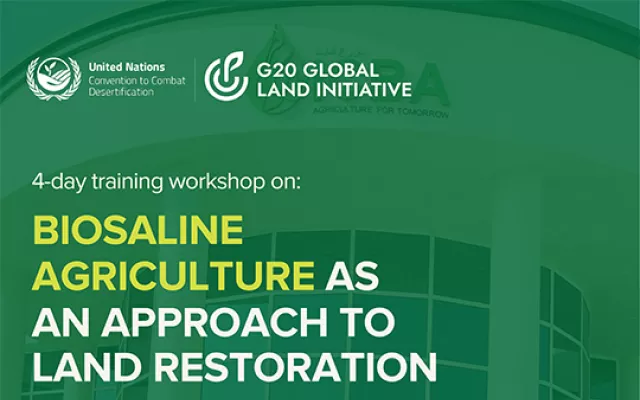ICBA wins prestigious international date palm award
14 March 2022
The International Center for Biosaline Agriculture (ICBA) has won a special award of the Khalifa International Award for Date Palm and Agricultural Innovation for a multi-stakeholder project in the UAE.
The award was presented by H.E. Sheikh Nahayan Mabarak Al Nahayan, Minister of Tolerance and Coexistence of the UAE and Chairman of the Board of Trustees of the Khalifa International Award for Date Palm and Agricultural Innovation, and received by Dr. Tarifa Alzaabi, Acting Director General of ICBA, at an official ceremony during the 14th session of the Khalifa International Award for Date Palm and Agricultural Innovation.
ICBA was selected in the category “Pioneering Development and Productive Projects” for the collaborative project co-financed through the Expo 2020 Dubai’s Expo Live Innovation Impact Grant Programme.
Titled “From desert farm to fork: value chain development for innovative halophyte-based food products”, the project was implemented by ICBA jointly with farmers in Abu Dhabi; the Abu Dhabi Agriculture and Food Safety Authority (ADAFSA); the Environment Agency – Abu Dhabi (EAD); the Khalifa Fund for Enterprise Development (KFED); and the Global Food Industries LLC.
Speaking about ICBA’s joint projects on date palm research, Dr. Tarifa Alzaabi said: “As part of our research collaboration with the Environment Agency – Abu Dhabi and the Plant & Food Research Institute from New Zealand, our scientists have determined the actual water requirements for the date palm varieties Lulu and Khalas. We now have water productivity data that helps to reduce irrigation in the UAE conditions by up to 50 percent. We have also collaborated with Zayed University to analyze the nutritional profile and mineral content of 18 date varieties, including Ajwa Al-Madina. And our results show that the average daily consumption of Ajwa Al-Madina in the UAE provides 43% of potassium, 23% of phosphorous, 14% of magnesium, and 6% of iron, which is much higher than other varieties.”
As part of the session’s program, ICBA also signed in the presence of H.E. Sheikh Nahayan Mabarak Al Nahayan, Minister of Tolerance and Coexistence of the UAE, H.E. Mariam bint Mohammed Almheiri, Minister of Climate Change and Environment of the UAE, and other dignitaries a memorandum of understanding along with the Food and Agriculture Organization of the United Nations (FAO); the International Center for Agricultural Research in the Dry Areas (ICARDA); the Arab Organization for Agricultural Development (AOAD); the Khalifa International Award for Date Palm and Agricultural Innovation (KIADPAI); the Arab Center for the Studies of Arid Zones and Dry Lands (ACSAD); and the Association of Agricultural Research Institutions in the Near East & North Africa (AARINENA) to establish the International Network for Sustainable Development of Date Palm in the Near East and North Africa.
Since 2002 ICBA has conducted different experiments in the UAE to determine the long-term effect of saline water irrigation on date palm growth, productivity, fruit quality, and the impact of salinity on the soil. The experiments are conducted on 18 date palm varieties from Saudi Arabia and the UAE, including Nabtat Sultan and Am-Al-Hamam, which are found to be very sensitive to salinity.
Scientists have also tested various water-saving technologies, including hydrogels and sub-surface irrigation systems. Results show that these technologies help to achieve water savings of 25-82 percent without any negative effect on yields.
As part of this research program, ICBA also evaluates the effectiveness of different techniques for controlling red palm weevil, including pheromone traps, traditional traps, chemical treatment, eco-friendly organic treatment, and electronic devices.
This research work also involves testing and implementing a system of the internet of things (IoT) and drone-based data collection integrated into a GIS-based AI analysis platform for monitoring the date palm plantation (Palm Smart Management Solution).











